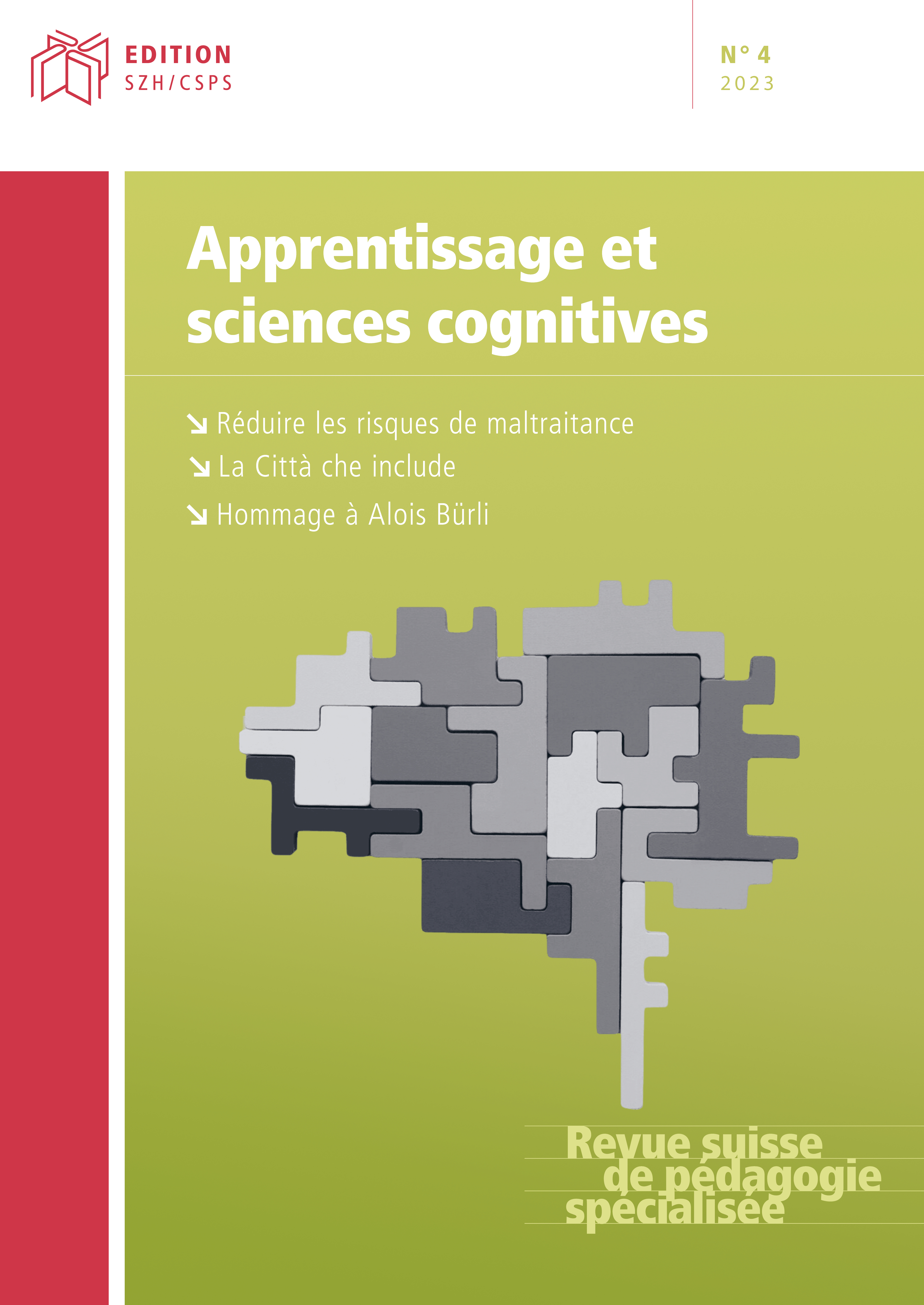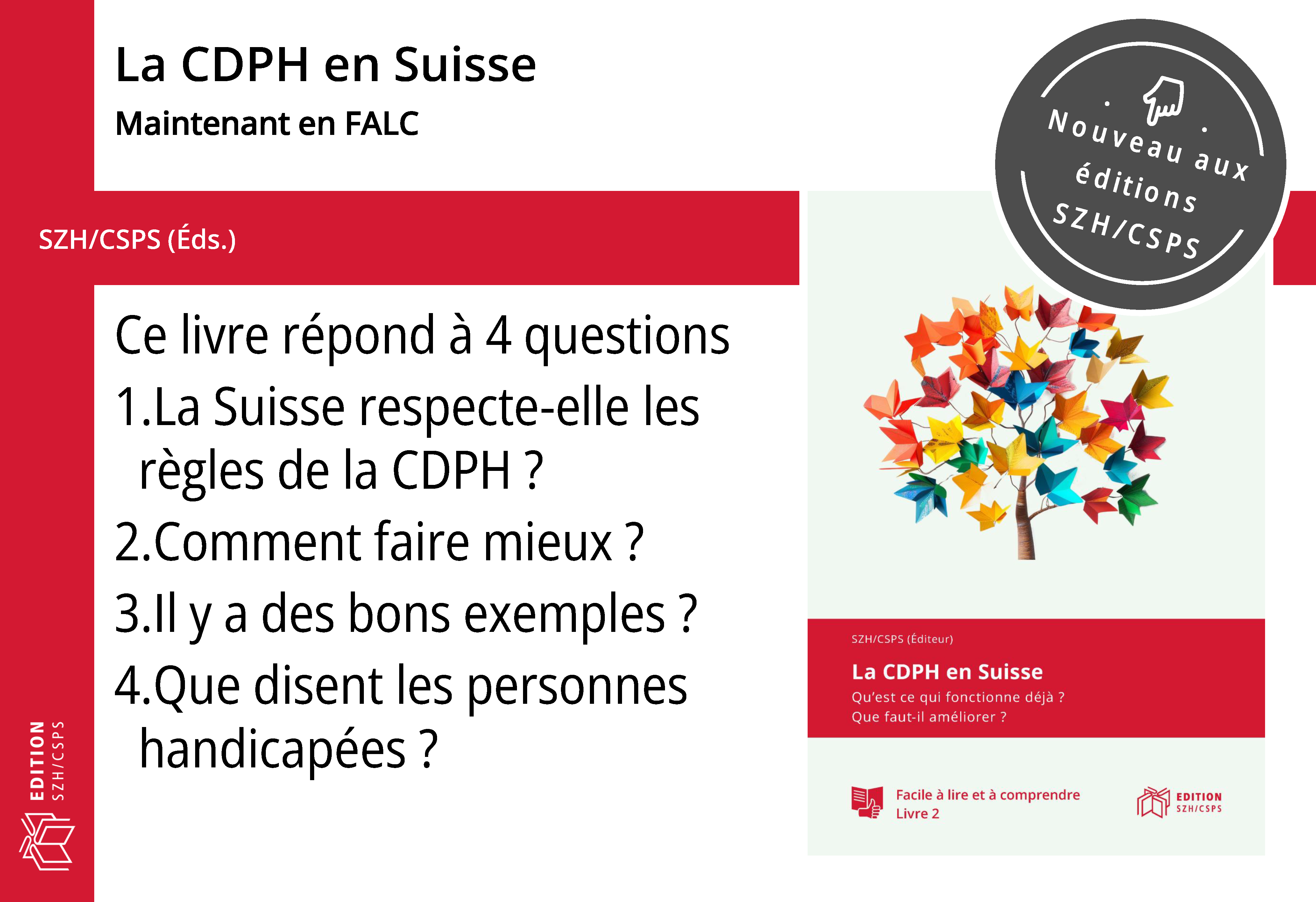Réduire les risques de maltraitance des personnes ainées présentant une déficience intellectuelle
Développement d’un programme de prévention adapté
DOI:
https://doi.org/10.57161/r2023-04-07Schlagworte:
ltere Mensch, Endscheiden, kognitive Beeinträchtigung, Missbrauch, PräventionAbstract
Wie können die Risiken von physischem und psychischem Missbrauch älterer Menschen mit kognitiver Beeinträchtigung reduziert werden? Dieser Artikel stellt die Entwicklung eines speziell konzipierten neuen Programms vor, das den Bedürfnissen von Personen mit kognitiver Beeinträchtigung ab 50 Jahren gerecht wird. Dieses Programm wurde in den USA in Kooperation mit Forscher:innen aus der Westschweiz entwickelt. Dabei wurden die Besonderheiten des Alterns sowie repräsentative Missbrauchssituationen berücksichtigt.
Literaturhinweise
Beaulieu, M., Carbonneau, H., Rondeau-Leclaire, A., avec la collaboration de Marcoux, L., Hébert, M. & Crevier, M. (2022). Maltraitance psychologique et maltraitance matérielle et financière envers les personnes ainées ayant des incapacités. Rapport de recherche partenariale entre la Chaire de recherche sur la maltraitance envers les personnes ainées et le CIUSSS de l’Estrie-CHUS remis à l’OPHQ. Sherbrooke.
Fitzsimons, N. M. (2017). Partnering with People with Disabilities to Prevent Interpersonal Violence: Organization Practices Grounded in the Social Model of Disability and Spectrum of Prevention. In A. Johnson, J. Nelson & E. Lund (Eds), Religion, Disability, and Interpersonal Violence (pp. 45-65). Springer. https://doi.org/10.1007/978-3-319-56901-7_4
Hickson, L., Khemka, I., Golden, H., & Chatzistyli, A. (2015). Randomized controlled trial to evaluate an abuse prevention curriculum for women and men with intellectual and developmental disabilities. American Journal on Intellectual and Developmental Disabilities, 120(6), 490–503. https://doi.org/10.1352/1944-7558-120.6.490
Hockley, J., Froggatt, K., Van den Block, L., Onwuteaka-Philipsen, B., Kylänen, M., Szczerbińska, K., Gambassi, G., Pautex, S., Payne, S. A., & PACE (2019). A framework for cross-cultural development and implementation of complex interventions to improve palliative care in nursing homes: the PACE steps to success programme. BMC Health Services Research, 19(1), 745. https://doi.org/10.1186/s12913-019-4587-y
Hollomotz, A. (2009). Beyond 'vulnerability': an ecological model approach to conceptualizing risk of sexual violence against people with learning difficulties. The British Journal of Social Work, 39(1), 99-112. https://doi.org/10.1093/bjsw/bcm091
Institut national de la santé et de la recherche médicale [INSERM]. (2016). Déficiences intellectuelles. EDP Sciences. https://www.inserm.fr/expertise-collective/deficiences-intellectuelles/
Khemka, I., & Hickson, L. (2015). ESCAPE-NOW : An effective strategy-based curriculum for abuse prevention and empowerment for individuals with developmental disabilities – NOW. Teachers College, Columbia University.
Khemka, I., & Hickson, L. (Eds.). (2021). Decision Making by Individuals with Intellectual and Developmental Disabilities. Springer.
Khemka, I., Hickson, L., & Tabin, M. (2022). ESCAPE-E : An Effective Strategy-Based Curriculum for Elder Abuse Prevention and Empowerment for Individuals with Developmental Disabilities [Curriculum]. St. John’s University, Queens, NY. https://escapeabuseprevention.weebly.com/new-elder-abuse-prevention.html
McKenzie, K., Martin, L., & Ouellette-Kuntz, H. (2016). Frailty and intellectual and developmental disabilities: a scoping review. Canadian Geriatrics Journal, 19(3), 103-112. https://doi.org/10.5770/cgj.19.225
Noir, S., & Petitpierre, G. (2012). La prévention de la maltraitance envers les personnes avec une déficience intellectuelle : présentation du programme ESCAPE-DD. Revue suisse de pédagogie spécialisée, 2(3), 16-21, https://www.szh.ch/bausteine.net/f/50838/Noir_Petitpierre_120316.pdf?fd=3
Petitpierre, G., Borloz, M., Fellay, F., & Léonard, E. (2016). ESCAPE-DD en Facile à Lire et à comprendre. Un programme d’apprentissage de stratégies de prévention des abus et de développement de l’empowerment destiné à des adultes ayant une déficience intellectuelle. Traduction française autorisée [Manuscript non publié]. Université de Fribourg.
Petitpierre G., & Tabin M. (2021). From social vulnerability assessment to active prevention measures: a decision-making perspective. In I. Khemka & I. hickson (Eds.), Decision making by individuals with intellectual and developmental disabilities (pp 469-498). Springer. https://doi.org/10.1007/978-3-030-74675-9_20
Schneiderhan, J., Guetterman, T. C., & Dobson, M. L. (2019). Curriculum development: a how to primer. Family Medicine and Community Health, 7(2), e000046. https://doi.org/10.1136/fmch-2018-000046
Yon, Y., Mikton, C. R., Gassoumis, Z. D., & Wilber, K. H. (2017). Elder abuse prevalence in community settings: a systematic review and meta-analysis. Lancet Global Health, 5(2), 147-156. https://doi.org/10.1016/S2214-109X(17)30006-2
Yon, Y., Ramiro-Gonzalez, M., Mikton, C. R., Huber, M., & Sethi, D. (2018). The prevalence of elder abuse in institutional settings: a systematic review and meta-analysis. European journal of public health, 29(1), 58–67. https://doi.org/10.1093/eurpub/cky093
Veröffentlicht
Zitationsvorschlag
Ausgabe
Rubrik
Lizenz
Copyright (c) 2023 Mireille Tabin, Ishita Khemka

Dieses Werk steht unter der Lizenz Creative Commons Namensnennung 4.0 International.



